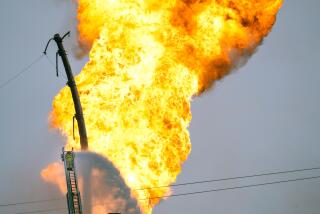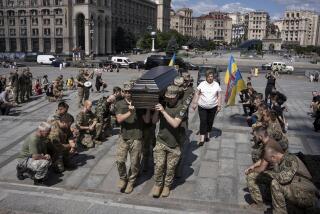Iraq Pipelines Easy Targets for a Saboteur
BAGHDAD â The targeting of Iraqi oil and natural gas pipelines by suspected saboteurs, whose handiwork was blamed for widespread power and water outages Tuesday, presents a new threat, experts say.
Iraq is crisscrossed by more than 4,000 miles of oil and gas pipelines. Some of the pipe is buried, making it difficult to attack, authorities said, but much of it is above ground and generally unguarded.
âPipelines are very soft targets,â said Robert Ebel, energy program director at the Center for Strategic and International Studies in Washington. âTheyâre easy to go after. It doesnât take a rocket scientist to figure out where you can do the most damage, both physical and psychological, with the minimum amount of effort and the minimum chance of being caught.â
A large portion of central Iraq, including Baghdad, suffered through an extended power outage that began Monday and continued Tuesday following a weekend explosion at a gas pipeline about 95 miles northwest of the city. It was the third pipeline explosion in two weeks and was believed to be an act of sabotage.
Allied officials have not released information about the extent of the damage or its effect on electrical and water supply systems. But sources at the United Nations and the International Committee of the Red Cross said the gas supply disruption had knocked out the four main power plants that run the grid for central Iraq.
Experts said the pipeline attacks are likely to increase popular resentment of the U.S.-led coalition by adding to the distress of Iraqis already disturbed by the slow pace of recovery, the lack of security and the unreliability of basic services such as power and water.
They also could further slow the recovery of Iraqâs crippled petroleum industry, which is struggling to produce enough oil to generate export revenue to finance the countryâs reconstruction.
The first attack occurred June 12 along the 600-mile line that carries crude oil from Iraqâs northern fields near Kirkuk to Turkeyâs port of Ceyhan on the Mediterranean Sea.
A second explosion struck a natural gas pipeline late Saturday near the town of Hit. For hours, balls of orange flame and clouds of black smoke filled the sky. Officials said the line transports gas from the Kirkuk region to various parts of Iraq. Much of the gas is used to fuel electrical power plants.
An official at Baghdadâs Doura refinery told Agence France-Presse that the explosion would disrupt power production at the cityâs major electrical plant. âIt will affect electricity generation directly,â said the official, Datar Qassib. âPeople are already living in hell, and itâs only going to get worse.â
Before the blast, the 740-megawatt Doura power plant was generating only about 200 megawatts, partly because of curtailed fuel supplies, officials said. The plantâs limited production has exacerbated the electricity problem in Baghdad, where the lights were on about 15 hours a day, on average, before the pipeline blast.
A third gas pipeline explosion occurred Monday outside the town of Abidiyah Gaarbiga, near the Syrian border in western Iraq. Iraqâs de facto oil minister, Thamir Ghadhban, said Tuesday that the explosion had disrupted a portion of the line that supplies a phosphate factory in Akashat.
Officials said it was unclear whether all three blasts were the work of saboteurs. But experts said it appears that opponents of the U.S.-led coalition are deliberately targeting pipelines in an effort to disrupt Iraqâs reconstruction.
âWhoever is carrying out these attacks is aware that pipelines are one of the vulnerable parts of the Iraqi oil and gas sector,â said oil analyst Raad Alkadiri at PFC Energy, a Washington-based consulting firm.
On Sunday, tanker ships began loading the first postwar exports of Iraqi crude at Ceyhan. But the oil had been sitting in storage tanks there since before the war, and officials said the June 12 pipeline explosion would delay the flow of newly produced oil from Kirkuk to Ceyhan.
Without revenue from oil exports, the coalition could face a cash crunch within months as funds from a $4-billion stash of frozen Iraqi assets are gradually depleted and $2.5 billion in reconstruction funds appropriated by Congress run out.
Iraqi officials had expected oil exports to generate as much as $5 billion during the second half of this year and up to $15 billion next year. But they have repeatedly scaled back their production targets, blaming widespread looting and sabotage for the slow recovery.
Iraqâs wells are currently pumping about 750,000 barrels of oil a day, officials said, far below the countryâs prewar production of more than 2.5 million barrels.
With afternoon temperatures soaring to more than 110 degrees and nights getting no cooler than 90, tempers are fraying and frustration with the Americans is growing.
Lines at gas stations, which had all but disappeared in recent weeks, were back with a vengeance because the pumps rely on electricity to power them.
The impact of the power outage has been compounded by the paralysis of the water system, which also relies on electrical pumps to move the water into homes.
Most of the 6 million people in Baghdad and the surrounding area were able to coax no more than a thin trickle from their faucets Tuesday.
âWe are like fish, we cannot live without water,â said Abdul Ghan Wadi, a mechanical engineer. âI suppose we can go and wash in the Tigris.â
*
Rubin reported from Baghdad and Vieth from Washington.
More to Read
Sign up for Essential California
The most important California stories and recommendations in your inbox every morning.
You may occasionally receive promotional content from the Los Angeles Times.










